Enhancing Customer Interactions
The evolution of customer service has seen significant transformations over the past few years, particularly with the rise of virtual customer service agents. These advancements have reshaped how we interact with our clients, providing us with tools to enhance our communication and improve overall service efficiency.
Evolution of Virtual Agents
Virtual agents have progressed from basic scripted response tools to sophisticated AI-powered systems capable of delivering personalized customer experiences. This progression has led to their integration into various sectors, including healthcare, hospitality, legal, real estate, and professional services. AI receptionists now not only field inquiries but also engage in meaningful conversations, understanding customer needs and responding with empathy. This transformative approach allows businesses to extend their reach, providing support that is both context-aware and adaptive to the specific circumstances of customer interactions (Genesys).
Our reliance on these intelligent agents is further reinforced by data indicating that by 2027, chatbots are expected to become the primary customer service channel for approximately 25% of businesses. As AI technology continues to develop, the role of virtual customer service agents in enhancing client relationships will only grow.
Adoption Trends in SMBs
The adoption of virtual customer service agents among small and medium businesses (SMBs) is steadily increasing. Currently, 82% of companies are planning to utilize AI agents within the next three years, showcasing a significant trend toward embracing this innovative technology (Moveworks). For SMBs, this shift is especially crucial, as they typically have limited resources but high customer interaction demands.
The following table illustrates the growing acceptance of AI in various service-oriented industries:
| Industry | Current AI Adoption Rate (%) | Expected Adoption in 3 Years (%) |
|---|---|---|
| Healthcare | 55 | 75 |
| Hospitality | 60 | 80 |
| Legal | 50 | 70 |
| Real Estate | 45 | 65 |
| Professional Services | 57 | 75 |
Source: Industry reports and surveys
The integration of virtual agents signifies a critical shift in service dynamics, leading to improved customer satisfaction and loyalty. By leveraging AI technologies such as AI chatbots for customer service, we can streamline our operations and enhance our interaction capabilities, providing a level of service that was previously unattainable. Exploring the benefits of AI receptionists and staying informed about AI customer service trends can help us make informed decisions as we navigate this technological landscape.
Benefits of Virtual Customer Service Agents
Virtual customer service agents have transformed the way businesses interact with clients, particularly in service-driven sectors. By leveraging technology, these agents offer numerous advantages that enhance customer satisfaction and operational efficiency.
24/7 Support Capabilities
One of the most significant benefits of adopting virtual customer service agents is their ability to provide 24/7 support. These AI-driven chatbots eliminate wait times by offering immediate assistance, ensuring customers receive help whenever they need it. Organizations that have implemented chatbots, such as Photobucket, have seen remarkable improvements, including a 3% increase in Customer Satisfaction (CSAT) and a 17% enhancement in first resolution time (Zendesk).
| Benefit | Impact |
|---|---|
| Continuous Support | Available any time, day or night |
| Increased Satisfaction | Boost in CSAT and resolution times |
| Global Reach | Assistance for customers worldwide |
AI is going to reshape every industry and every job.
— Reid Hoffman, Co-founder of LinkedIn
Personalized Customer Experiences
Virtual customer service agents utilize advanced technologies, such as Natural Language Processing (NLP) and machine learning, to analyze customer interactions and tailor responses. By understanding context and intent, these intelligent agents can provide personalized recommendations and solutions based on real-time customer data (Automation Anywhere).
In service sectors like healthcare or hospitality, personalized customer experiences contribute to higher loyalty rates and improved customer relationships:
| Feature | Advantage |
|---|---|
| Data Analysis | Leverages customer data for tailored solutions |
| Adaptability | Continuously improves interactions over time |
| Engagement | Creates a more engaging customer experience |
Consistent Support Interactions
Consistency is crucial in customer service. Virtual customer service agents ensure that interactions are uniform and adhere to the brand’s communication guidelines. This consistency helps establish trust and credibility with customers. The autonomous nature of AI agents means that they maintain a high level of accuracy in responses, reducing the chances of contradictory information being provided.
In addition, businesses can expect improved response times and resolution capabilities, leading to a smoother customer service experience overall:
| Consistency Aspect | Outcome |
|---|---|
| Uniform Responses | Builds brand trust and reliability |
| Fast Resolution | Enhances overall customer satisfaction |
| Accurate Information | Reduces confusion and service errors |
By integrating virtual customer service agents, small and medium businesses can optimize their customer interactions, ensuring that they are available, engaging, and consistent. This technology not only supports operational efficiency but also fosters long-lasting relationships with clients. To explore more benefits, check our article on ai receptionists benefits.
AI Agents in Service Industries
AI agents are transforming service-driven sectors by enhancing customer interactions and streamlining operational processes. In this section, we will explore the applications of virtual customer service agents in healthcare and hospitality industries.
Healthcare Applications
In the healthcare sector, virtual customer service agents are enabling healthcare providers to deliver improved patient experiences. These AI-driven assistants automate routine tasks such as appointment scheduling, patient inquiries, and follow-up reminders. By employing natural language processing (NLP), these agents understand patient context and provide relevant responses, enhancing satisfaction and reducing the workload for healthcare staff.
According to research, by 2028, an estimated 15% of daily work decisions in healthcare are expected to be automated by agentic AI, demonstrating the growing reliance on AI to streamline processes and optimize decision-making (Moveworks).
| Application Area | Benefits |
|---|---|
| Appointment Scheduling | Reduces administrative burden |
| Patient Inquiries | Provides 24/7 access to information |
| Follow-up Reminders | Improves patient engagement |
The implementation of AI agents in healthcare contributes to operational efficiency and allows staff to focus on more complex patient care tasks. Moreover, autonomous customer support powered by AI significantly reduces resolution times, showcasing the impact these tools have on enriching patient experiences.
Hospitality Implementation
In the hospitality industry, AI virtual agents play a key role in enhancing the guest experience. They handle tasks such as booking management, answering common inquiries, and providing personalized recommendations based on guest preferences. By streamlining workflows, these AI-driven tools help establishments optimize their operations and improve service quality.
AI-powered tools in hospitality improve response times, thereby boosting satisfaction levels among guests. Virtual agents can quickly respond to inquiries about room service, amenities, and local attractions, ensuring guests receive timely and accurate information. The integration of AI technology allows hotels and restaurants to maintain a competitive edge in providing seamless customer service.
| Application Area | Benefits |
|---|---|
| Booking Management | Efficiently handles reservations |
| Guest Inquiries | 24/7 support and boosted engagement |
| Personalized Recommendations | Improves guest satisfaction |
Implementing virtual customer service agents in hospitality results in not only time and resource savings but also enhanced overall productivity. As organizations adopt generative AI within their customer service operations, they benefit from increased efficiency and service quality (Zendesk). These advancements are essential for service-driven businesses aiming to deliver a superior customer experience.
To learn more about the advantages of AI receptionists, check our article on ai receptionists benefits. For additional insights on current trends in AI customer service, see our discussion on ai customer service trends.
Practical Examples
When it comes to leveraging virtual customer service agents, various companies have successfully integrated AI chatbots into their operations. These examples illustrate how organizations can enhance customer interactions and streamline processes.
Bank of America’s Erica
Bank of America’s Erica is a pioneering chatbot that provides personalized financial guidance. By employing natural language processing (NLP), Erica understands customer requests and assists with tasks such as managing bank accounts, tracking spending, and handling bill payments. This level of service not only improves customer satisfaction but also allows for efficient banking solutions. For more on the advantages of AI receptionists, visit our article on ai receptionists benefits.
H&M’s Kik Chatbot
H&M’s Kik chatbot engages with users by offering fashion advice and personalized recommendations. With over 15 million monthly active users, Kik utilizes NLP to provide a seamless shopping experience, making it a valuable tool for the retail sector. This interaction not only boosts customer satisfaction but also encourages brand loyalty. To learn about customer service trends driven by AI, check out our article on ai customer service trends.
Pizza Hut’s Chatbot
Pizza Hut has implemented a chatbot within Facebook Messenger that facilitates food ordering. This smart virtual agent leverages NLP to understand customer orders and provide real-time updates on the status of the delivery. By streamlining the ordering process, Pizza Hut enhances customer convenience and satisfaction. Companies looking for AI-driven solutions can explore ai chatbots for customer service.
| Company | Chatbot Name | Key Features |
|---|---|---|
| Bank of America | Erica | Personalized financial guidance, account management |
| H&M | Kik | Fashion advice, personalized recommendations |
| Pizza Hut | Pizza Hut Chatbot | Order placements via Messenger, real-time updates |
| Casper | Insomnobot | Personalized mattress recommendations, engaging content |
Casper’s Insomnobot
Casper’s Insomnobot sets itself apart by assisting customers in selecting the best mattress based on their sleep preferences. This chatbot maintains customer engagement with friendly messages, ultimately promoting a better sleep experience. Such personalized interactions can significantly impact customer loyalty and retention.
By examining these practical examples of virtual customer service agents, we can see their effectiveness across different industries, driving improvements in customer engagement and operational efficiency. For insights into the software solutions available for AI receptionists, explore our article on ai receptionists software solutions.
Efficiency and Effectiveness
Impact on Operational Processes
We can see a significant transformation in operational processes with the integration of virtual customer service agents. Many businesses are leveraging these AI solutions to enhance their service capabilities and efficiency. For instance, over 60% of organizations have adopted generative AI within their customer service operations, leading to a dramatic reduction in resolution times by close to 90% (Automation Anywhere). These improvements allow customer service teams to handle a higher volume of interactions without sacrificing quality.
The use of AI chatbots also streamlines workflows by automating repetitive tasks. Programs like Zendesk’s AI agents can manage up to 80% of customer interactions, freeing human agents to focus on more complex and high-value tasks. This shift leads to increased productivity and a more efficient customer support model.
| Efficiency Metrics | Before AI Implementation | After AI Implementation |
|---|---|---|
| Average Resolution Time | xxxx | xxxx |
| Volume of Interactions | xxxx | xxxx |
| Agent Satisfaction Rate | xxxx | xxxx |
| Customer Satisfaction Rate | xxxx | xxxx |
Case Studies and Results
Let’s explore some real-world examples to illustrate the effectiveness of virtual customer service agents in driving efficiency:
- Unity Technologies: By implementing AI agents, Unity saved $1.3 million in support costs. This demonstrates how automating customer interactions not only improves response times but can also result in substantial financial savings for organizations (Zendesk).
- ChatGPT by Freshworks: Freshworks reported a drastic reduction in the time taken to create complex software applications, going from 10 weeks to under a week. This improvement can be attributed to ChatGPT, which assists in coding and even debugging, showcasing the far-reaching impact of AI beyond customer service (Forbes).
- Business Trends: According to the Zendesk Customer Experience Trends Report 2023, 72% of business leaders prioritize expanding AI and chatbots across customer experience channels over the next year. As chatbots are projected to become the primary customer service channel for around 25% of businesses by 2027 (Sprinklr), we can expect even greater efficiencies to unfold.
These insights indicate that the integration of virtual customer service agents is not just a trend but a significant shift in how we approach customer interactions, leading to improved operational efficiency and enhanced customer satisfaction. For more information on leveraging these technologies, consider exploring our articles on ai receptionists benefits and ai customer service trends.
Integration and Implementation Strategies
To successfully leverage virtual customer service agents in our businesses, we must adopt effective integration and implementation strategies. These strategies facilitate a smooth transition to AI-driven solutions, enhancing our customer interactions.
Key Features to Look For
When investing in virtual customer service agents, certain features are essential for maximizing their efficiency and effectiveness. We should look for AI agents that offer the following capabilities:
| Key Feature | Description |
|---|---|
| Seamless Integration | The ability to integrate effortlessly with existing systems ensures that we can enhance our operations without overhauling current processes. |
| Intelligent Decision-Making | The AI should enable data-driven insights and facilitate smart choices based on customer interactions. |
| Fluid Workflows | AI agents should create streamlined processes that minimize bottlenecks and improve service speed. |
| Advanced Capabilities | Features such as natural language processing (NLP) and tone analysis enhance customer interactions by understanding sentiment and intent (Automation Anywhere). |
By prioritizing these elements, we can ensure our virtual customer service agents effectively meet our needs and those of our clients.
Streamlining Workflows
Integrating virtual customer service agents should also focus on streamlining workflows within our organizations. They can automate responses to frequently asked questions (FAQs), categorize and prioritize support tickets, and offer self-service solutions. This not only reduces the burden on human agents but also elevates the customer experience by providing quick, accurate answers (Automation Anywhere).
Additionally, incorporating AI in customer service quality assurance (QA) allows businesses like ours to evaluate conversations, providing insights into performance and enhancing agent training. For example, Rentman has successfully integrated these systems, resulting in high customer satisfaction scores and rapid initial response times (Zendesk).
Getting started with AI requires us to identify pain points, choose appropriate tools like Agentforce and Service Cloud, and begin small to gradually integrate these systems. Proper training for our AI models and ensuring collaboration between AI agents and human staff is vital for unlocking the full potential of our customer service interactions (Salesforce).
By focusing on key features and streamlining workflows, we can create a customer service environment that is as efficient as it is responsive, ultimately leading to better experiences for both our team and our customers. For more insights on the benefits of AI, check out our article on AI receptionists benefits.





